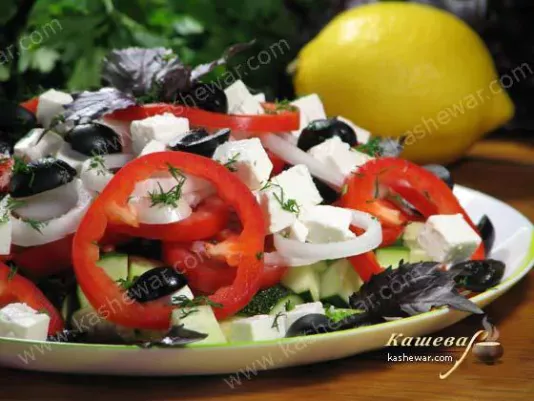Pork and Sweet Pepper Appetizer
Pork and sweet pepper appetizer is a Greek recipe that is very easy and quick to prepare.

Greek cuisine is considered the embodiment of the Mediterranean way of life – sun-kissed, rich in aromas, and inspired by history. Its roots go back thousands of years: even in antiquity, Greeks created dishes that combined nutrition and flavor. Key ingredients have remained unchanged through the ages: olive oil, vegetables, grains, cheese, fish, and herbs. Greek cuisine reflects the simplicity of peasant food, enhanced by touches of refinement. Seasonality is essential – meals are prepared only with ingredients available at a given time of year. Dishes are cooked slowly, with love, and with minimal spices to highlight the product’s natural flavor. Every meal is an opportunity to gather with family, share wine and fresh bread. This makes Greek cuisine not just a culinary tradition, but a lifestyle where food is closely tied to culture, family values, and the philosophy of moderation.
Greek cuisine recipes are known for their ease of preparation and versatile ingredients. Many dishes are plant-based: moussaka is an eggplant casserole with meat and béchamel sauce; gigantes are large beans in tomato sauce; dolmades are grape leaves stuffed with rice and spices. Greek salad (horiatiki) is a classic found in every region, with slight variations. Seafood – from octopus to sardines – is grilled or stewed with olive oil and lemon. Dishes often include herbs like oregano, mint, thyme, and parsley. Feta cheese is a staple ingredient added to salads, pies, and casseroles. Baked goods are dominated by phyllo dough: pita, baklava, bougatsa. Every region has its own recipes passed down through generations, with each dish echoing history, culture, and a love for life.
Greek cuisine is built on the principles of simplicity, seasonality, and balance, yet it has also openly absorbed outside influences over the centuries. The diet is based on grains, legumes, vegetables, fruits, herbs, fish, dairy, and moderate amounts of meat. Historically, Greeks observed numerous religious fasts, which contributed to the development of vegetarian and fasting-friendly dishes. The Byzantine and Ottoman legacies introduced spices, new cooking techniques, and phyllo-based desserts. Yet despite all influences, Greek cuisine has retained its character: the goal is not to mask the ingredient’s flavor, but to emphasize its natural essence. The country’s gastronomy also includes the philosophy of “meze” – small portions of various dishes served with wine or ouzo. This is not just food but a social tradition, a way to connect and enjoy the moment.
Among the most common ingredients in Greek cuisine is olive oil, used in every dish – from salads to desserts. Vegetables – tomatoes, cucumbers, eggplants, peppers, zucchini, spinach – form the foundation of the daily diet. Legumes like lentils, chickpeas, and beans often substitute for meat. Cheeses such as feta, halloumi, and anthotyros are ever-present in salads, casseroles, and pies. The main spices are oregano, basil, mint, rosemary, and garlic. Grains – bread, bulgur, pasta – are also widely used. For sweets: honey, nuts, cinnamon, and layered pastry dough. Beloved pairings include feta with watermelon, tomatoes with oregano, lemon with garlic, and mint with eggplant. Thanks to simple ingredients and the absence of heavy sauces, the dishes remain light and easy to digest while being rich in flavor. The combination of freshness, acidity, and fat creates the unique taste profile of Greek cuisine.
Greek culture is closely linked to holidays, and each is marked by traditional dishes. For Easter, magiritsa (a liver soup), Easter pie, and roasted lamb are must-haves. Christmas features kourabiedes, honey cookies (melomakarona), and vasilopita (New Year’s pie with a coin). During fasting periods, meals are rich in legumes, vegetables, and seafood without animal fats. Festive tables are always abundant with “meze”: plates of assorted appetizers, cheese, olives, spreads, and bread. Wine, ouzo, or raki are essential accompaniments. Cooking is often a family affair: baking Easter breads or rolling dolmades brings everyone together. Greek feasts are not just meals – they are rituals of connection, expressions of hospitality and generosity, which remain core values of Greek society.
Modern Greek cuisine continues to evolve while respecting authentic recipes and local products. Young chefs experiment with presentation, techniques, and combinations but stay true to the principles of seasonality and simplicity. Gastro bars with updated versions of classic dishes have gained popularity: meatless moussaka, pita with chickpea cream, desserts made with yogurt and pure honey. At the same time, interest in local farming, organic products, and sustainable practices is growing. Greek gastronomy is successfully integrating into the global restaurant scene while remaining recognizable thanks to its bold flavors, health benefits, and deep cultural meaning. Today, Greek cuisine is not only a part of national identity but also a major player on the international culinary stage.